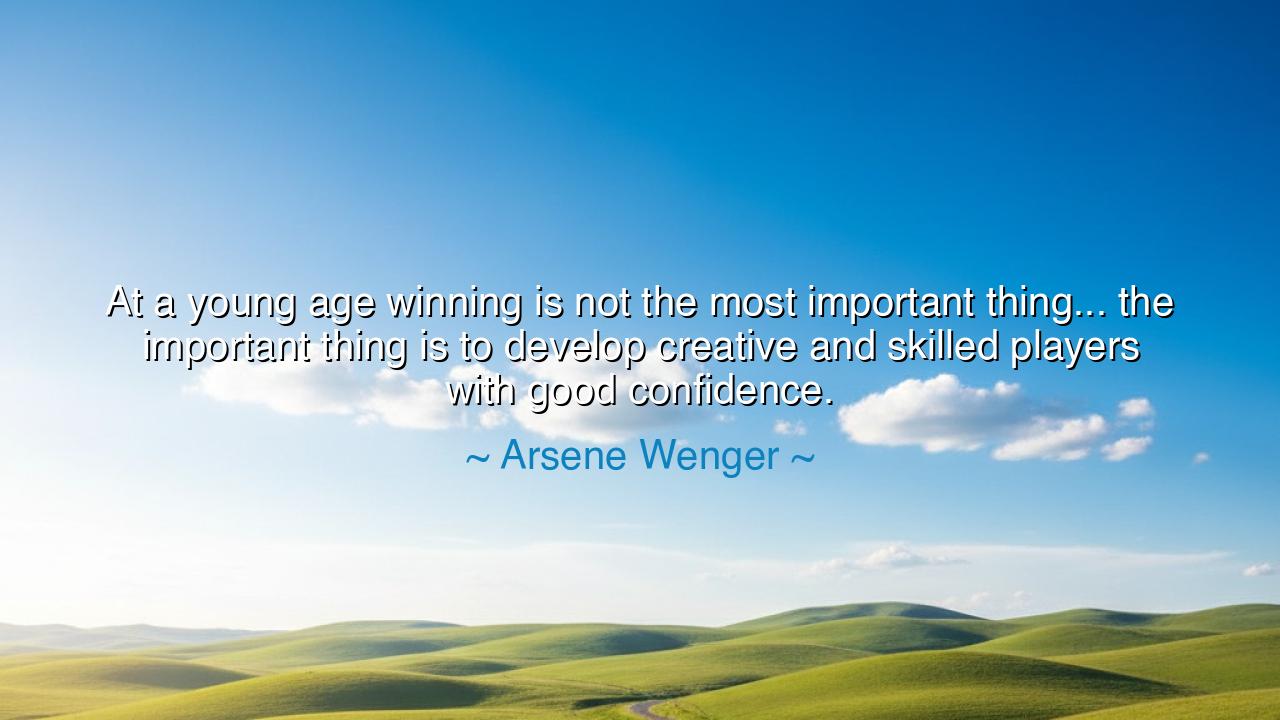
At a young age winning is not the most important thing... the
At a young age winning is not the most important thing... the important thing is to develop creative and skilled players with good confidence.






In the quiet dawn of youth, where the winds of possibility swirl like leaves on the ground, winning is but a fleeting shadow. There, in the hands of the untested, it is not the triumph that holds the greatest weight, but the forging of character, the shaping of the mind, and the nurturing of the soul. For it is in the crucible of learning and growth that greatness is born, not in the fleeting celebration of victory. It is said that Arsène Wenger, the revered sage of football, spoke words to guide us in understanding this truth: “At a young age winning is not the most important thing... the important thing is to develop creative and skilled players with good confidence.” These words, simple in their nature, carry a weight of wisdom that can echo through generations, if we are but wise enough to listen.
At the dawn of their journey, young players are like raw clay, untouched by the hands of experience. They are filled with the promise of what they may one day become, yet without the right guidance, they are but wild, untamed spirits. Wenger’s words call upon us to see beyond the fleeting moments of victory, to look instead at the longer arc of development. For it is in the early days of a child's training that their confidence and creativity are forged. To focus only on the prize is to ignore the heart, the very essence that will one day lead them to achieve even greater things than mere victory.
To understand this, we must look at the story of the great Leonardo da Vinci, who, in his youth, was not celebrated as the master of art he would become. Instead, he was an apprentice—learning, experimenting, failing, and growing in skill. Had he been judged only by his early failures, his name would not be etched in history. But his teachers, the masters who guided him, knew that to cultivate creativity and skill was far more important than simply achieving immediate success. They did not demand perfection from the beginning, but sought to foster a mind that could think, a hand that could create, and a soul that would never be afraid to fail.
In the same vein, Wenger understood that football, like any noble pursuit, was not about the immediate glory of victory, but the inner strength of those who played the game. He knew that, like young Leonardo, each player must be given the time and space to develop their own unique style, to explore the limits of their abilities, and to build confidence in themselves. For it is confidence that turns a fearful mind into one that dares to dream, and it is in those dreams that true greatness is born.
Yet how often do we, as a society, fall prey to the temptation of immediate success? How often do we celebrate the child who wins the race or scores the goal, without recognizing the deeper qualities that made that victory possible? The true tragedy is not in the losing of the game, but in the failure to see that the victory of one moment is not the measure of the whole. The path to greatness is long, and it is the work done in the shadows—the hours of practice, the lessons learned through failure, the quiet moments of reflection—that make the champions of tomorrow.
One might look to the legendary Michael Jordan, who was famously cut from his high school basketball team. The world was unaware that the greatest player to ever live was not yet born, and it was in the harshness of this early rejection that his confidence grew. Jordan did not despair. Instead, he poured himself into his craft. He did not look to win in the short term, but to develop his skills with such relentless passion that, in time, victory became inevitable. His story teaches us that failure is not the end, but the beginning of a greater journey—a journey of personal transformation and growth.
Thus, the lesson of Wenger’s words is this: to win is but a brief moment in time, a fleeting gust of wind. But to build—to create, to develop, to nurture—is an eternal process, one that shapes not only the individual but the world around them. It is the art of cultivating confidence in the face of adversity, of trusting in the process, even when victory seems distant.
Let us then, in our own lives, take this wisdom to heart. If we are to truly succeed, we must not focus only on the immediate rewards but on the long journey of self-discovery. Let us develop our talents, hone our skills, and trust in the process of becoming. And let us pass this wisdom on to those who will follow us: that true victory lies not in the immediate prize, but in the journey of becoming a person of confidence, creativity, and skill—a person who, in the fullness of time, will not only win, but inspire others to do the same.






AAdministratorAdministrator
Welcome, honored guests. Please leave a comment, we will respond soon